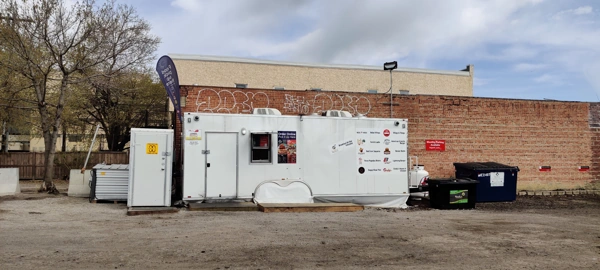Thoughts on ghost kitchens
I have never used any of those food delivery apps, so ghost kitchens are a new concept to me. If you’re not familiar, ghost kitchens are an arrangement where a company lists a non-existent restaurant on a delivery app. The food is then made in another kitchen on behalf of the fake restaurant.
Big chains will have several storefronts on these apps for each physical kitchen they run, letting them draw unwitting customers with trendier branding, with virtually no overhead per store. Some companies have actually started running locations that are soley ghost kitchens. A single, unmarked, delivery-only kitchen will prepare food for maybe dozens of brands at once.

As I said before, I never use delivery apps, so none of this really affects me directly for the time being. But this all made me think about the strangeness of branding as a concept. With this setup, they’ve effectively decoupled brands from kitchens, making a “restaurant” as a branding concept fully separable from any physical place. It’s kind of like cloud computing for food service: you can run any software (brand) you want on top of the available hardware (kitchens).
Cloud computing makes sense to me. It’s just another degree of abstraction in a field where abstraction is already a core concept. And I’m sure from the corporations’ perspective, ghost kitchens make the same kind of sense.
But something feels really odd to me about this level of alienation from a real place, while still maintaining the pretense of a place. It feels like restaurants and the concepts surrounding them should be embedded in real places you can go and interact with people, and whatever ghost kitchens are should be something different, if they should even exist at all.
If we consider the corporations’ perspective again, “a real place” is not what a restaurant is, and it hasn’t been for a long time. Since the rise of fast-food franchising, brand and kitchen have been separable, but in the opposite way: many kitchens all implementing a single brand. The “restaurant” is just an abstraction, a template set by the franchising corporation to be faithfully executed on by franchisees.
Any time you walk into, say, a Culver’s, you have a certain set of expectations about that experience that almost all come from the brand “Culver’s”. Almost none of your expectations come from the specific place you’re actually in.
If you were going to a local place there’s only one of, some of your expectations might come from the restaurant’s branding, but much more of it comes from the specific place (perhaps you’re friendly with the waitstaff). And since there’s only one, the branding is much more tied to the specific place, so in a way they’re kind of the same thing.
I think these brand-controlled expectations lead to a sort of experience filtering in fast food chains like Culver’s. The expectations lead us to miss the specific details of the place we’re in and experience the whole visit as an abstraction instead. This is the alienation induced by brands: they exist to make us experience reality on their terms, by way of abstraction, rather than experiencing things as they are.
Branding & advertising are ludicrously empowered forces in our society, but I like to think once you’ve noticed a pattern like this, you can start to resist it. Next time you visit a chain, make sure to notice the details. Remember someone’s name, take in the view from the window, look for scuffs & smudges. It’s a challenge, but see whether you can make it feel like a real place.
What do you think about ghost kitchens?
Do you notice your experience being filtered at fast food chains?
Does branding make you a little sad when you think about it?
Let me know your thoughts at my Ctrl-C email: gome @ ctrl-c.club.